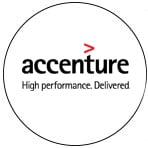
A number of years ago, while interviewing an individual for an open position on my team, he shared a very personal concern with me. He told me that he was gay and that was causing him concern about how he would be perceived, should he be out in the workplace with his colleagues. He also worried that he may be treated differently because of his sexuality.
My response was swift.
At Accenture, we celebrate the diversity of our people because we believe it makes us stronger and smarter. I was clear it was his skills not his sexuality that set him apart.
I didn’t think twice about my response – it comes naturally in a place where diversity is lauded. At the same time, I understood his apprehension and appreciated both his willingness and desire to be open. The legal world, like many others, often lacks diversity and acceptance.
But not here.
At Accenture, we understand that inclusion and equality are essential to high performance – because it’s not just the right thing to do, it’s good for business. We wholeheartedly believe in the power of diversity driving innovation. We are more than 394,000 people of various backgrounds and differences – in terms of ethnicity, religion, gender, sexual orientation, age and disability – and we strive to offer an environment where, regardless of these differences, everyone has equal opportunity.
I’m proud to say that our previous general counsel, Julie Sweet (now Chief Executive Officer – North America) and our current general counsel, Chad Jerdee, are both fierce advocates and role models for diversity and inclusion.
Julie pioneered the publication of our workforce demographics in the United States, making Accenture the first large professional services company to do so. She also recently led a highly effective virtual diversity town hall, which brought together thousands of our people across the US to discuss national issues around race.
Chad is also very committed to our initiatives, particularly those that provide support and advance workplace accommodations for persons with disabilities. A few years ago while riding his motorcycle, Chad was hit by a drunk driver and lost his leg. Since his accident, he has been open and vocal about his experience – about having to adjust both mentally and physically to a sudden and traumatic change.
Leaders like Julie and Chad embody our commitment to diversity, while the legal group at Accenture as a whole help to drive and inform on wider initiatives, in order to ensure a workplace where everyone is treated fairly and equally. This commitment extends outside of the company as well, from how we approach potential hires, to helping inform the diversity and inclusion initiatives of the legal firms with which we work.
The legal team at Accenture are undertaking a number of initiatives on the diversity and inclusion front, with an aim to attracting, advancing and sparking conversation around these issues:
-
- We are in the process of instituting a new program in the United States in which we’re hiring in–house lawyers straight out of law school, versus just those with prior legal experience. The ability to attract diverse candidates is heightened by reaching them earlier in the process, and we know that the pipeline of diverse talent thins when hiring only experienced legal professionals.
-
- We have committed to advancement and retention. We recently launched a sponsorship program with a clear focus on high-potential diverse individuals. As part of this focus, we’re pairing minority individuals – whether in terms of gender, ethnic background, sexual orientation or any other minority group – with executive-level legal professionals who are typically outside their normal reporting line to increase visibility and opportunity.
-
- Internally, we’re bringing our people together to celebrate ethnicity and spark conversation. For example, we recently hosted an event called ‘Exploring Authentic African Caribbean/African American/Black Leadership & Shaping the Future’ where we brought together black lawyers and contract professionals to focus on factors and actions required to facilitate their advancement. Event speakers touched on diversity and implementing change. Participants then broke into teams to brainstorm projects focused on fostering a better working environment and presented their ideas to senior leadership to help make them a reality.
-
- Outside of Accenture, we’re partnering with organizations such as North American Minority and Women Owned Law Firms (NAMWOLF), whose mission is to identify law firms owned by minorities and women and assess their ability to gain and retain business with Fortune 500 companies like Accenture. By working with NAMWOLF, we have increased the number of women and minority-owned firms that we employ. Additionally, we’re working to shape the landscape among outside providers. When we partner with external firms, we solicit information on their inclusion and diversity practices, ensuring they align with our own commitments and helping them identify areas for improvement.
These are just a few of the ways in which we’re advancing inclusion and diversity on our legal team at Accenture. We remain committed to recruiting, hiring and retaining the best talent by empowering our people to promote their own advancement. While we still face challenges – including how to fill gaps for diverse legal leadership – we’re excited about the progress we have made. At the same time, we remain humbled by the understanding that there is always room to improve.

